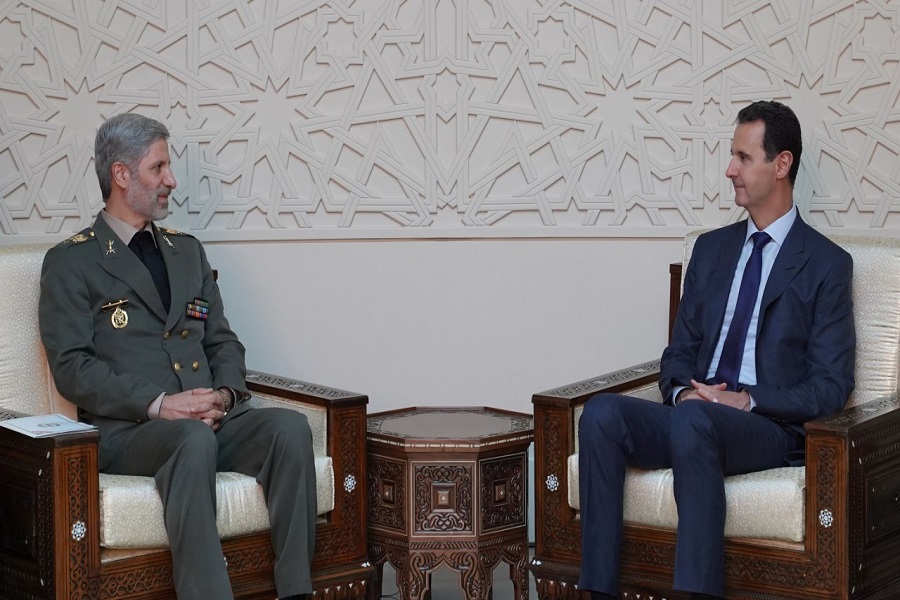
Just hours after the signing of the agreement between Iran's Defense Minister Amir Hatami and his Syrian counterpart Ali Abdullah Ayoub, the Zionist media reacted, saying the important visit by the Iranian defense minister to Syria was aimed at strengthening the anti-Israeli alliance between Tehran and Damascus while it tended to be a response to the recent visit by US National Security Advisor John Bolton to the Occupied Territories.
But away from the Zionist media hype all aimed at undermining the strategic alliance between Tehran and Damascus and paving the ground for ending Iran's presence in the country, the reality is that Syria for the past eight years has been entangled in a crisis planned and orchestrated by some trans-regional Western governments and their Arab regional allies.
Over the past eight years, more than 360,000 terrorists were recruited from 120 countries to be organized into more than 100 similar terrorist groups and enter Syria using borders of the neighboring countries like Turkey and Jordan. Just within two years the terrorist groups who had all-out financial, military, training and media support of their regional and trans-regional promoters, could overwhelm the country and occupy more than 80 percent of the Syrian territory to reach doorsteps of Damascus.
The Syrian legitimate government, in the face of the ongoing crisis, asked Iran and Russia to come to its aid by sending their military advisors to stop the terrorists and their atrocities in the country. It took five years for the Syrian army to liberate terrorist-controlled areas.
Now, the Syrian armed forces have the upper hand with 80 percent of the territories previously dominated by the terrorists under their control. It is expected that the occupied lands in northwestern country, including Idlib, parts of Latakia, Aleppo, and Hama soon be liberated from the terrorists, as well.
With their plot to submerge Syria in an unending crisis failed, the plotters and those originally orchestrated the crisis in the country, including the Zionist regime of Israel, are very concerned about the future of the country and the role Damascus can play as a member of the Axis of Resistance.
Passing through the crisis, Syria has learned a lot and now the country has enough experience to forcefully stand against the Israeli aggressions.
If Syria, faced with more than 60 cases of aerial and missile aggressions over the past 18 years, used to stop short of taking practical actions, but solely issuing a statement and reporting the Zionist measures to the United Nations, now it powerfully responds to such aggressions. Evidence to this is the shooting down of an advanced Israeli F-16 fighter jet as well as intercepting two rockets launched from the Occupied Territories to hit targets in Syria.
Frustrated by their inability to defeat the Resistance Axis formed by Iran, Syria and Lebanon, Israel and its allies in the West have to deal with a movement far capable and experienced than before and the one which in the post-crisis era is far more connected, deeply-rooted and developed.
The Syrian defense minister during his meeting with his Iranian counterpart reiterated that Syria could defeat terrorism through cooperating with the Axis of Resistance, including Iran.
'In the absence of all the supports given to Syria by Iran, the country would have never been able to defeat terrorism,' Ali Abdullah Ayoub said.
Syrian President Bashar al-Assad also said during his meeting with Iran's General Hatami that it was vital for Tehran and Damascus to continue efforts aimed at fostering coordination and cooperation between the two nations to guarantee permanent ties.
Such comments by the Syrian officials on the need for the two countries to deepen further their relations tend to be no accident.
Article written by Davoud Poursehat, a Middle expert of the Islamic Republic News Agency (IRNA)
Abridged and translated by Reza Bahar
Edited by Hamid Shamlou
2044**2050
Follow us on Twitter @IrnaEnglish
 solhkhabar | Peace International News Agency Peace International News Agency , Peace News , International Agency News of Peace
solhkhabar | Peace International News Agency Peace International News Agency , Peace News , International Agency News of Peace